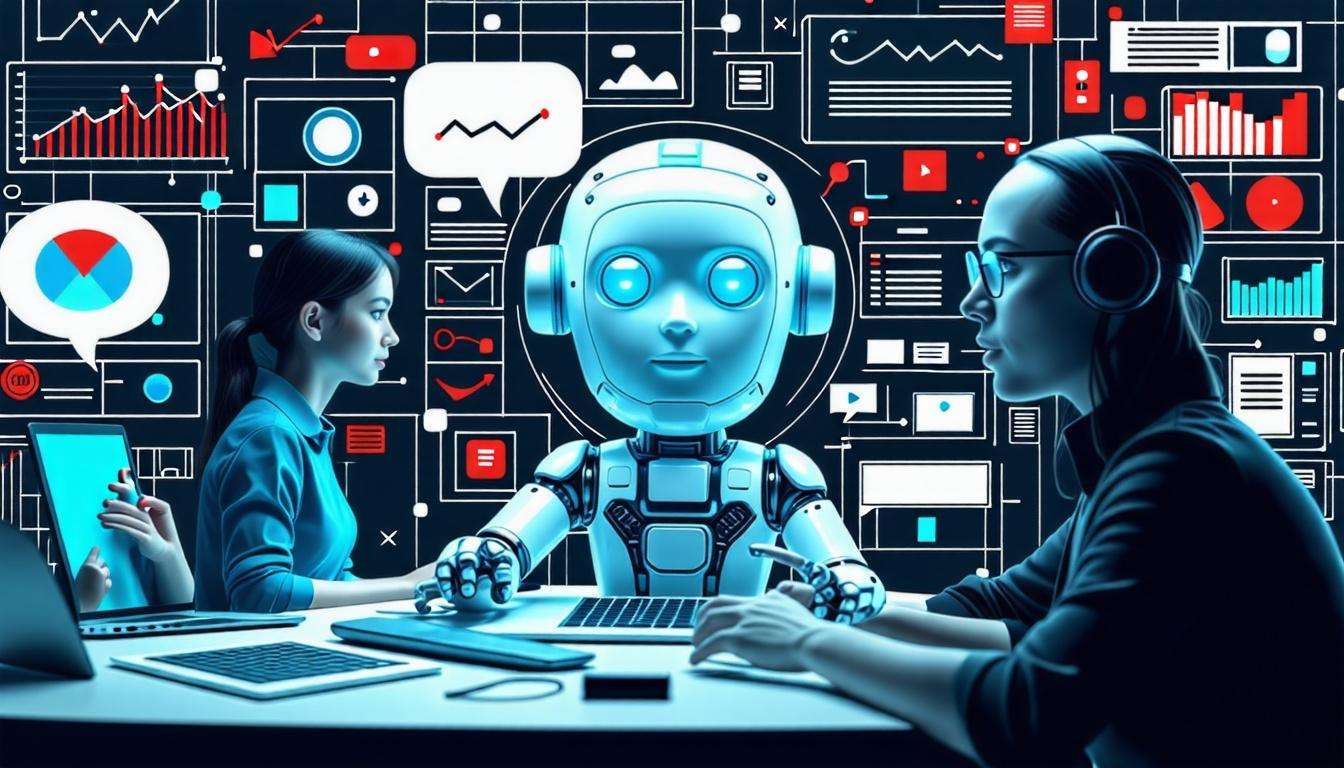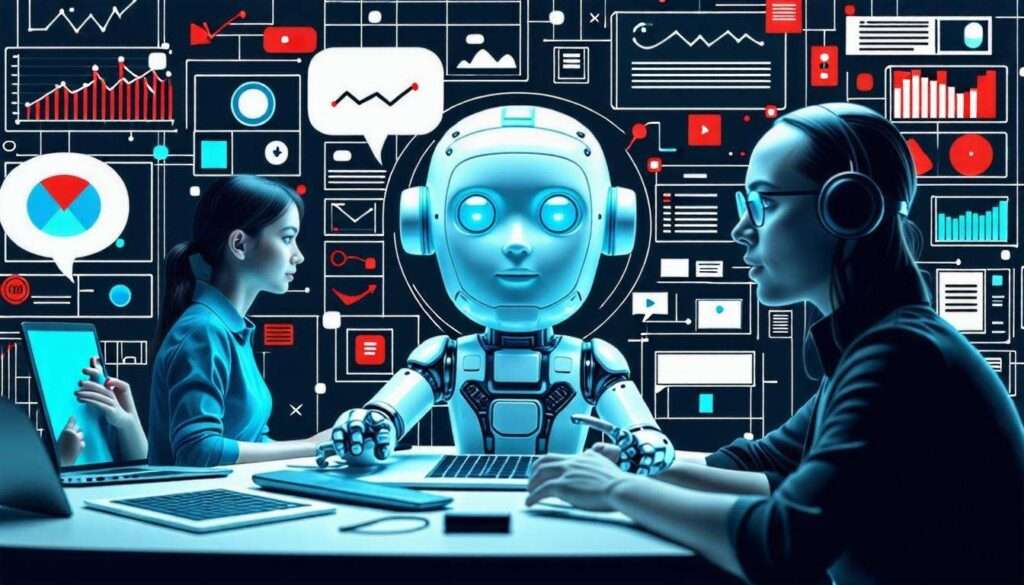As we approach 2025, the area of artificial intelligence (AI) is on the brink of a transformation. Picture a future where AI not only comprehends our needs but actively enhances our lives—transforming our relationship with technology and reshaping sectors from healthcare to retail.
This article explores seven key AI trends set to define 2025. Innovations such as conversational AI, predictive analytics, and hyper-personalization will emerge, creating a world where AI seamlessly integrates into our everyday experiences. By grasping these trends, we can confidently steer the AI-driven future that awaits us.
Key Takeaways
- AI systems are shifting to a human-centered model, prioritizing user empowerment, inclusivity, and well-being. Think of it as crafting a digital friend who truly understands you.
- Keep an eye on trends like conversational AI, predictive analytics, and hyper-personalization—these are reshaping how brands connect with consumers, much like a tailored suit fits perfectly.
- Businesses are diving deeper into AI, honing in on return on investment (ROI) and the critical importance of clean data. It’s like building a sturdy house; without a solid foundation, everything crumbles.
- Expect the rise of multimodal AI, capable of processing different content types at once. This advancement will boost automation and lift customer experiences, akin to a maestro conducting a symphony.
Rise of Conversational AI and Hyper-Personalization

The rise of conversational AI ushers in a new era where machines engage with us like friends. Imagine asking your device a question and receiving a response tailored just for you. This is the heart of hyper-personalization. It goes beyond simply knowing your name; it’s about understanding your preferences and predicting your desires.
By 2025, anticipate that AI trends will further enrich these interactions. With breakthroughs in natural language processing and machine learning, chatbots and voice assistants will evolve, learning from our conversations to create seamless, engaging experiences. Think of it like a garden; the more care and attention it gets, the more it blossoms.
As we steer this AI-driven place, we must confront data privacy and AI ethics. Just as we wouldn’t want someone snooping through our diary, protecting our data is critical. By striking a balance between innovation and responsibility, we can use the power of AI-powered applications while testing our information safe.
| AI Trend | Description |
|---|---|
| Conversational AI | AI that comprehends and responds to human language. |
| Hyper-Personalization | Tailoring experiences based on individual preferences. |
Advancements in Predictive Analytics and Data-Driven Decision-Making

What if predicting the future was as simple as checking the weather?
That’s the magic of predictive analytics! By leveraging artificial intelligence (AI) and machine learning, we can steer vast data landscapes to make well-informed choices. Think of it as a crystal ball that unveils consumer behavior and highlights emerging trends.
By 2025, we’ll see revolutionary advancements in this arena. For instance, neural networks will turbocharge real-time analytics, allowing businesses to pivot quickly in response to market changes. It’s like having a superhero ready to spring into action instantly’s notice!
Plus, AI ethics will play a critical role in ensuring these powerful tools are used responsibly. As we steer the complicated place of data privacy and AI governance, we must ask ourselves: how do we balance innovation with ethical responsibility?
As we harness big data and AI-driven applications, the future of data-driven decision-making is set to transform industries such as healthcare and finance, while also creating smarter cities and enhancing our everyday lives.
Integration of AI in Healthcare and Personalized Medicine
The integration of AI in healthcare and personalized medicine equips doctors with remarkable tools. Imagine if every doctor had a magic crystal ball to predict our health needs! This is the power of AI, leveraging predictive analytics and machine learning to sift through patient data and suggest tailored treatments that remarkably improve patient outcomes.
By 2025, we expect advanced innovations like wearable technology and telehealth services to become commonplace. These technologies serve as personal health assistants, continuously monitoring our well-being. With deep learning and natural language processing, AI can unravel complex medical information at lightning speed.
Yet, we must emphasize AI ethics and data privacy. Just as we wouldn’t want strangers reading our diaries, protecting our health information is necessary. As we accept this AI-driven future, it’s critical that technology fosters equity, narrowing health disparities instead of widening them.
Ethical AI and Governance in Future Technologies
As we explore into Ethical AI and governance, a critical question emerges: how can we make sure technology truly benefits humanity?
Imagine AI as a double-edged sword; when used wisely, it can solve complex challenges in healthcare and finance. But, without clear guidelines, it can lead to serious issues like bias and data privacy violations.
By 2025, anticipate a stronger focus on algorithmic fairness and transparency in AI. Companies must reveal how their AI systems function, much like a recipe that details every ingredient. This transparency builds trust in AI and promotes responsible practices. For example, in smart cities, AI can improve traffic management, but it must be designed to treat all citizens fairly.
The rise of human-centric AI emphasizes user well-being. This approach is like having a supportive coach rather than a strict referee. As we adopt these technologies, we must also reflect on their societal impacts, ensuring they enrich our lives while honoring our fundamental values.
Emergence of Multimodal AI and Enhanced User Experiences
The rise of multimodal AI is like a symphony, where different instruments blend to create a rich, immersive experience. Consider how we communicate: we use words, gestures, and emotions. Similarly, multimodal AI harmonizes text, audio, and visual data, making our interactions with machines feel intuitive and engaging.
By 2025, we can expect seven transformative trends that will reshape the AI place:
- Integrated Systems: Businesses will use multimodal AI to gain more in-depth insights, merging computer vision and natural language processing to clarify user intent.
- Personalized Experiences: AI will analyze our preferences, offering tailored recommendations that feel distinctively ours.
- Cross-Modal Analysis: Utilizing data from diverse sources will improve our understanding and predictions of user behavior.
- Enhanced Engagement: Virtual assistants will evolve to respond with human-like intuition, making interactions feel more natural.
- AI Ethics: As AI progresses, prioritizing ethical guidelines will protect our data privacy.
- Smart Cities: Multimodal AI will help create environments that adapt to our needs in real-time.
- Immersive Technologies: Expect a surge in augmented reality experiences that seamlessly merge the digital and physical worlds.
As we accept these advancements, our technology interactions will deepen, resembling conversations with a friend who truly understands us.
AI Design That Has Human-Centered Respect
Exploring AI Design That Respects Human-Centered Values is like crafting the ideal chair: it must accept the user. How can we make sure that artificial intelligence truly honors our needs?
Enter human-centered design. Imagine AI as a supportive friend, always ready to assist without overshadowing our lives.
By 2025, we expect a shift towards inclusive design that empowers users. Picture, a welcoming space where everyone belongs. AI systems will prioritize emotional intelligence and algorithmic fairness, ensuring every voice is heard. Just as in a meaningful conversation, AI should adapt based on our preferences.
We will see breakthroughs in personalization and accessibility, making technology more intuitive. Imagine stepping into a smart city where everything responds to your needs! This human-centered approach will create AI-powered applications that enrich our lives while protecting our data privacy.
As we accept AI, let’s make sure it remains our ally, not a replacement. After all, isn’t it more rewarding when technology serves us rather than the other way around?
Limiting the Edge on LLMs
The future of artificial intelligence (AI) is promising, yet we must tread carefully. As we near 2025, how can we limit the edge on large language models (LLMs)? Picture LLMs as high-speed trains; without proper tracks, they could derail. What strategies can we do to make sure they remain both effective and ethical?
A key trend is the emergence of purpose-built AI. Instead of trying to do everything, these models focus on specific tasks. Think of it as a chef using a sharp knife for precision rather than a bulky cleaver. This specialization enhances model efficiency and reduces energy consumption.
We also need to tackle AI ethics and data privacy. As we harness AI’s capabilities, we must ask: how can we eliminate algorithmic bias? By implementing AI governance and ensuring transparency, we can build trust in these technologies.
Our goal is to nurture a future where human-AI collaboration thrives, making our lives easier while upholding our values. In this way, we can open up AI’s potential without losing sight of what truly matters.
Summing up
By 2025, AI is set to transform our lives and workplaces dramatically. Envision a future where humans and machines work hand in hand, elevating teamwork to unprecedented heights. AI will allow us to make smarter decisions in critical fields like healthcare and finance. Imagine chatbots that not only respond but anticipate our needs, streamlining our daily tasks and nurturing stronger relationships. Approaching these innovations with curiosity and openness will empower us to thrive in this changing place.
Frequently Asked Questions
What technologies are driving the AI trends projected for 2025?
Key technologies driving AI trends in 2025 include generative AI, multimodal AI, quantum computing, and enhanced human-AI collaboration.
What is the future trend of AI?
In 2025, expect deeper human-AI collaboration, personalized experiences, and autonomous AI agents transforming work and life.
How will the AI trends of 2025 impact different industries?
AI trends in 2025 will improve efficiency, personalize experiences, and drive innovation across healthcare, finance, and e-commerce.
What are the predictions for AI in 2025?
In 2025, expect enhanced human-AI collaboration, personalized e-commerce, and AI agents revolutionizing workflows across industries.




